Dairy goats are a type of livestock commonly raised for their milk. While goats are not as large as cows, they still require proper care to produce milk. This blog post will explore how to care for dairy goats, including shelter and housing, fencing, feeding, and disease control. Goat shelters can be either simple or complex structures. The climate is the most crucial factor in deciding what type of shelter to build. Dairy goats need protection from the elements, especially in cold weather.
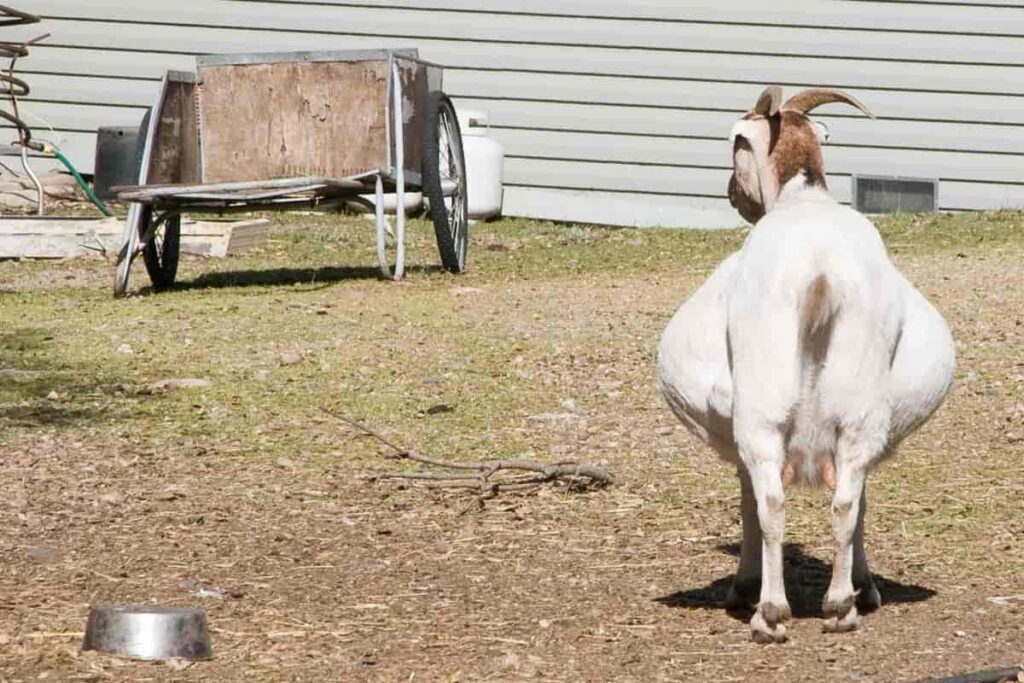
They also need access to fresh water and hay. Fencing is another important consideration when raising dairy goats. Goats are curious creatures and will try to escape if given the opportunity. A well-built fence will keep them safe and secure. Dairy goats also require a special diet to produce milk. They need plenty of hay, grain, and water. Disease control is also essential to keep your goats healthy and produce milk.
How to care for dairy goats
Dairy goat shelter and housing
Assuming you keep your goats outdoors, they will need a shelter to protect them from the weather and predators. The size and type of shelter you provide depend on your climate and how many goats you have. A basic goat shelter should have three walls and a roof. The fourth wall can be open or partially open, depending on the climate. The protection should be large enough for all your goats to lie simultaneously comfortably.
The roof should be pitched so that rain and snow will run off, and it should be made of sturdy material to protect the goats from the weather. The walls can be made of wood, metal, or any other durable material. Your goats will also need access to fresh water and hay. If you live in a cold climate, you will need to provide a heat source for the shelter so that the goats stay warm in winter.
Dairy goat fencing
Dairy goats need a well-fenced area to roam and graze. A typical fence for dairy goats is 4 feet tall with a 2-inch wide mesh. The mesh size is important because it needs to be small enough to keep kids from getting their heads stuck in the fence but large enough so that adults can’t catch their horns. The fence should be strong and in good repair, with no gaps or holes that goats could escape through.
In case you missed it: How to Apply for Bank Goat Farming Loan in India: Procedure, Documents, Eligibility, and Interest Rate for SBI, Canara, HDFC, and Mudra
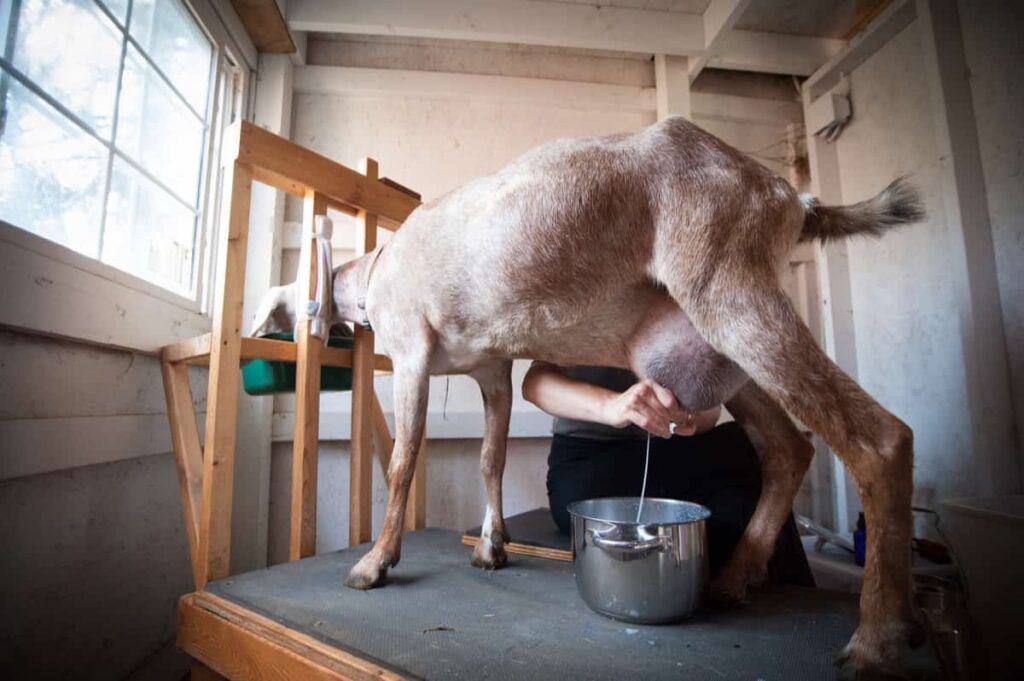
It’s also important to have a separate area for kidding (birthing) Does, as they will need extra care and attention during this time. When choosing a location for your goat fence, remember that goats like to climb and explore. So ensure the fence is secure and reinforced at the top if possible. If you live in a region with predators such as coyotes or foxes, you’ll need to take extra precautions to keep your goats safe.
Dairy goat feeding
Assuming you raise dairy goats for milk production, they must be fed a balanced diet to maintain their health and produce high-quality milk. The amount of feed each goat needs will depend on its age, breed, body condition, and stage of lactation. In general, dairy goats should have access to hay at all times. Hay is an important fiber source and helps the digestive system function properly. Grass or legume hay is best, but alfalfa hay can also be fed in small amounts.
However, grain or concentrate mixes should be provided in limited quantities, as too much can lead to obesity and other health problems. Grazing is another important part of the diet for dairy goats. Usually, goats browse rather than graze, so they eat leaves and vegetation rather than grass. Allow your goats to graze on the pasture for at least part of the day.
This will give them essential nutrients and help keep their rumens working correctly. Water is an essential nutrient for all animals, including dairy goats. Make sure your goats have access to clean water at all times. During hot weather or when they produce a lot of milk, they will need additional water to stay hydrated.
Common dairy goat diseases, symptoms, and causes
There are a few common diseases that can affect dairy goats. The most common is mastitis, which is an infection of the udder. This can be caused by bacteria getting into the udder through the teat canal. Mastitis can cause the udder to become swollen and painful. If not treated on time, it can result in goats death. Another common disease is CAE or caprine arthritis encephalitis. This is a viral disease that affects the joints and nervous system. It can cause paralysis and even death in severe cases.
In case you missed it: Agriculture in Uganda: Types, Importance, Crops, and Statistics
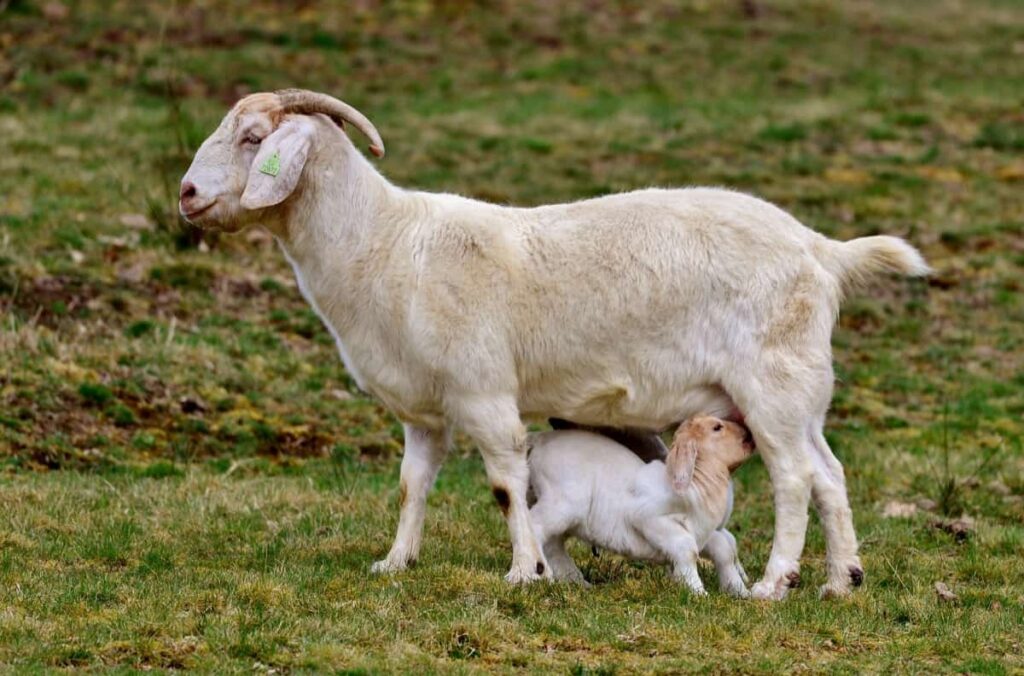
Scrapie is a fatal disease affecting sheep and goats nervous systems. It is thought to be caused by a prion, an abnormal protein. Scrapie is not yet known to affect humans but is fatal to animals. Pneumonia is another common disease in dairy goats. It is usually caused by bacteria but can also be caused by viruses or fungi. Pneumonia can be severe and even fatal in some cases. Dairy goats are also susceptible to parasites, such as stomach worms and lice. These can cause illness and even death if not treated.
Dairy goat disease control
Dairy goats are susceptible to several diseases, many of which are contagious. Therefore, it is important to take measures to prevent and control disease to maintain your herd’s health. One of the most important options is to maintain a clean and sanitary environment. This includes regular cleaning and disinfection of housing and equipment and practicing suitable biosecurity protocols such as footbaths and quarantine procedures.
In addition to good sanitation, goats also need a balanced diet to stay healthy. A diet that is too high in protein can lead to health problems such as ketosis, so it is important to feed quality hay or pasture along with a ration designed for dairy goats. Vaccinations are another critical part of disease prevention in goats.
Vaccines are available for common goat diseases such as brucellosis, chlamydia, and tetanus. Consult with your veterinarian to determine which vaccines are appropriate for your herd. Finally, it is important to monitor your goats for signs of disease and consult a veterinarian if any illnesses are suspected. Early diagnosis and treatment can help improve the chances of a successful recovery.
Benefits of baking soda and water for goats
Baking soda and water can be used as natural antacids for goats. Goats are prone to stomach upsets and indigestion, so this simple remedy can help to soothe their tummies. You will need to mix 1 teaspoon of baking soda with 1 cup of water. Give your goat this mixture twice a day or as needed.
What does apple cider vinegar do for goats?
Apple cider vinegar is the best and popular natural remedies for various ailments in goats. It can be used to treat digestive issues, respiratory problems, and skin conditions. Apple cider vinegar is also effective in preventing and treating parasites.
In case you missed it: Contract Goat Farming in India: How to Earn an Extra Income from this Long-Term Investment
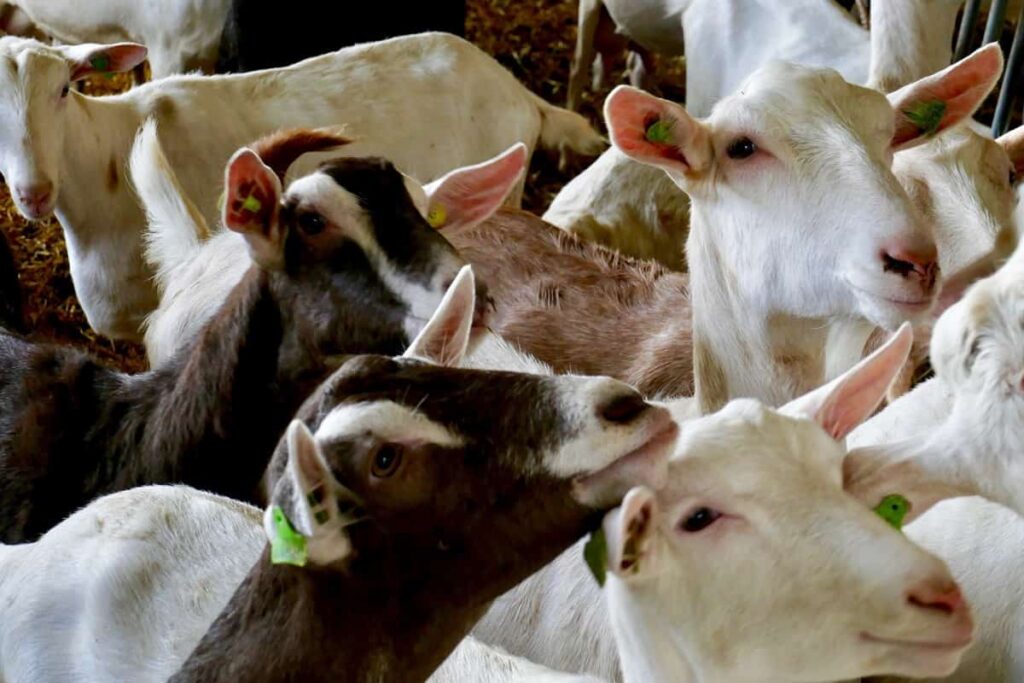
What does Cinnamon do for goats?
Cinnamon is a spice that has many benefits for goats. It can help improve food digestion, reduce inflammation, and boost the immune system. Cinnamon can also help to fight off infections and parasites.
What does garlic do for goats?
Garlic is a natural herb that has numerous benefits for goats. It can help prevent and treat infections, improve digestion, and increase milk production. Garlic is also known to repel insects, which makes it an excellent natural pest control for goats.
What does cabbage do to goats?
Goats are curious creatures and will often eat anything they can get their hands on. However, a goat eating a large amount of cabbage could cause digestive issues. Cabbage contains high levels of sulfur, which can cause gas and bloat in goats (and humans). It is also a goitrogen, meaning it can interfere with thyroid hormone production. Overeating cabbage could lead to hypothyroidism in goats. In severe cases, it could even be fatal. Cabbage is not poisonous to goats but should be fed in moderation.
Why do goats need salt blocks?
Goats need salt blocks to help them stay healthy and hydrated. Salt blocks provide goats with essential minerals and electrolytes needed to stay healthy, and they also help keep goats hydrated by encouraging them to drink more water. Therefore, salt blocks are an important part of a goat’s diet, and they should always have access to one.
What is the best natural dewormer for goats?
Many natural dewormers are available for goats, and it can take time to choose the best one. Some factors to consider include the type of worms your goat has, the severity of the infestation, and your goat’s overall health. One popular natural dewormer for goats is the diatomaceous earth. This is made from the fossilized remains of algae and is effective against various worms.
In case you missed it: How to Start Goat Farming in Philippines: Goat Breeds and Check How this Guide Helps Beginners
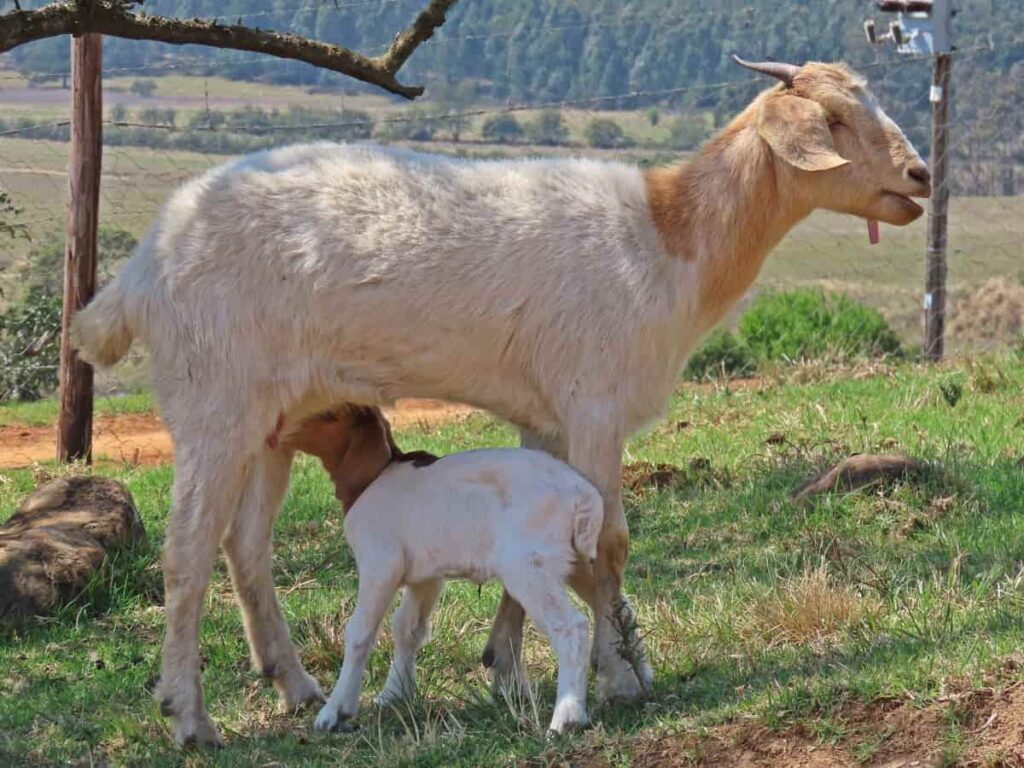
It works by puncturing the worms’ exoskeletons, causing them to dehydrate and die. Another option is garlic. This common kitchen spice contains an allicin compound, which is effective against certain types of worms. You can give your goat garlic in several ways, including adding it to their food or water or making a garlic infusion. If you’re looking for a more gentle option, consider using herbs such as wormwood or black walnut.
These herbs can help to expel worms from the gut without causing harm to the goat. Finally, always remember that prevention is key when dealing with worms in goats. Ensure your goats have access to clean and fresh water and plenty of pasture or hay to graze on. Keep their living area clean and free of manure, and practice good biosecurity measures if other animals are on your property.
How often should you deworm your goats?
Deworming goats is important to keep them healthy, but how often should you do it? There are couple of things to consider when deciding how often to deworm your goats, including their age, health, and environment. Kids, or baby goats, should be dewormed every 2 to 4 weeks until they are 6 months old.
After that, they can be dewormed every 3 to 6 months. If your goats are healthy and live in a clean environment, you can get away with deworming them less often. But if they are sick or live in an unclean environment, you may need to deworm them more often. The best way to know is to have your vet check your goats and develop a deworming schedule that’s right for them.
How do you increase your goat’s milk production?
- Make sure your goats are well-fed and have access to plenty of fresh, green pasture. Goats are browsers who prefer to eat leaves and vegetation rather than grass. They also need a good source of hay or other roughage to help their digestion.
- Provide your goats with a high-quality mineral supplement that includes trace minerals. Goats need a balance of major minerals like calcium and phosphorus and trace minerals like copper, zinc, and selenium.
- Ensure that your Does are getting enough water. Goats are susceptible to dehydration, so always have fresh water available.
- Avoid stress whenever possible.
In case you missed it: Tips to Start a Goat Farming Business: Check How this Guide Helps Beginners
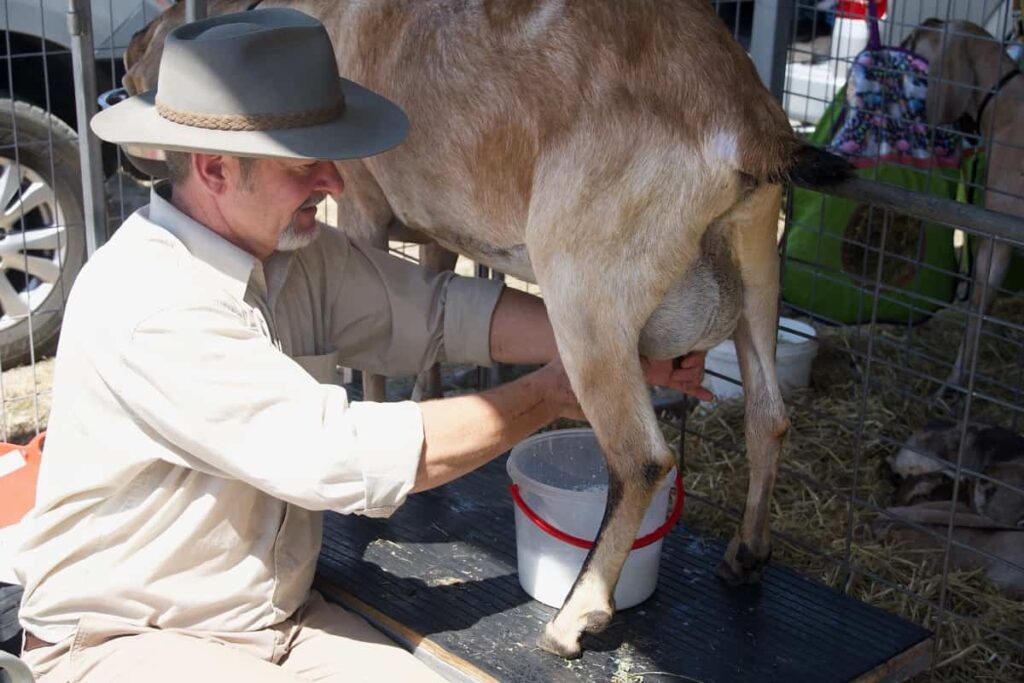
Goats are sensitive animals, and any stress can impact their milk production. Therefore, try to keep their environment as calm and consistent as possible. Following these simple tips can help increase your goat’s milk production.
Conclusion
Caring for dairy goats can seem daunting, but it doesn’t have to be. Following these simple tips on shelter, fencing, feeding, and disease control, you can provide your goats with everything they need to stay healthy and happy. With a little effort and plan, you can create a safe and comfortable environment for your herd that will allow them to thrive.
- Profitable Village Farming Business Ideas in 2024
- High-Yield Aquaculture: Fast-Growing Fish for Farming
- Effective Fish Pond Construction Techniques for Beginners
- Irrigation and Water Management in Pineapple Farming
- Blossom to Harvest: Mastering Flowering and Pollination in Papaya Farming
- Pig Fattening Essentials: From Selection to Sale for Beginners
- Raising Wagyu Cattle: A Complete Guide for Premium Beef Production
- Soil Types and Their Water Holding Capacity
- Optimizing Irrigation Schedules for Coconut Groves for Enhanced Yield
- Espresso Your Garden: Coffee Grounds for Healthier Acid-Loving Plants
- The Best Soil Mix for Snake Plants: How to Mix Your Own Snake Plant Soil
- Green Thumb Success: Expert Tips for Cultivating Greenhouse Beans All Year Round
- Bloom All Year Round: The Ultimate Guide to Indoor Hyacinth Care
- Eco-Friendly Gardening: How to Make Liquid Fertilizer from Kitchen Waste
- Ultimate Guide to Grow Anise in Pots: Explore Seed Propagation to Harvesting
- Guide to Raising Chester White Pigs: Discover Breed Facts to Growth Management
- Mastering the Elegance: The Ultimate Guide to Weeping Cherry Tree Care, Planting, and Maintenance
- Ultimate Guide to Planting Garlic in Grow Bags: Growing Strategies for Beginners
- How to Fix Spider Plant Leaf-Related Problems: Natural and Organic Remedies
- 10 Reasons Why Your Tulsi Plant is Shedding Leaves: Home Remedies and Solutions
- Optimizing Growth and Yield: The Advantages of Palm Bunch Ash Fertilizer
- Utilizing Neem Oil Extract as a Natural Pesticide for Hydrangea
- From Soil to Harvest: Various Ways in Which Farmers Can Use AI Tools
- Steps to Encourage and Induce Citrus Flowers: A Comprehensive Guide
- How to Fix Snake Plant Leaf-Related Issues: Natural and Organic Remedies
- Transform Your Garden into a Fragrant Oasis with Raat Ki Rani (Night Blooming Jasmine)
- Discover the Ideal Chicken Breeds for Philippine Farms
- How to Create a Poultry Egg Farm Business Plan for Profits
- Grow Lemon Cucumbers Like a Pro: Insider Techniques for Bountiful Yields
- Ultimate Guide to Caring for Your Pink Princess Philodendron: Tips for Thriving Variegation
- Areca Nut Profit Per Acre: Calculating Yield and Cost of Cultivation
- How Kaveri Chicken is Becoming a More Profitable Breed in Indian Backyards
- Transform Your Barn: 9 Steps to Convert a Horse Stall into a Chicken Coop
- Exploring Suffolk Sheep Disadvantages with Limitations and Challenges
- Guide to Solving Potted Lemon Tree Problems: How to Revive Lemon Tree in Containers
- Steps to Encourage Female Pumpkin Flowers: Best Strategies for More Flowers and High Yields
